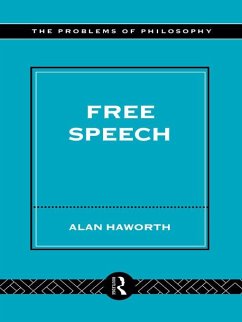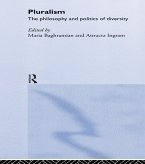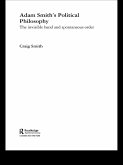Alan Haworth
Free Speech (eBook, PDF)
49,95 €
49,95 €
inkl. MwSt.
Sofort per Download lieferbar

25 °P sammeln
49,95 €
Als Download kaufen

49,95 €
inkl. MwSt.
Sofort per Download lieferbar

25 °P sammeln
Jetzt verschenken
Alle Infos zum eBook verschenken
49,95 €
inkl. MwSt.
Sofort per Download lieferbar
Alle Infos zum eBook verschenken

25 °P sammeln
Alan Haworth
Free Speech (eBook, PDF)
- Format: PDF
- Merkliste
- Auf die Merkliste
- Bewerten Bewerten
- Teilen
- Produkt teilen
- Produkterinnerung
- Produkterinnerung

Bitte loggen Sie sich zunächst in Ihr Kundenkonto ein oder registrieren Sie sich bei
bücher.de, um das eBook-Abo tolino select nutzen zu können.
Hier können Sie sich einloggen
Hier können Sie sich einloggen
Sie sind bereits eingeloggt. Klicken Sie auf 2. tolino select Abo, um fortzufahren.

Bitte loggen Sie sich zunächst in Ihr Kundenkonto ein oder registrieren Sie sich bei bücher.de, um das eBook-Abo tolino select nutzen zu können.
Free Speech is a philosophical treatment of a topic which is of immense importance to all of us.
Writing with great clarity, wit, and genuine concern, Alan Haworth situates the main arguments for free speech by tracing their relationship to contemporary debates in politics and political philosophy, and their historical roots to earlier controversies over religious toleration.
Free Speech will appeal to anyone with an interest in philosophy, politics and current affairs.
- Geräte: PC
- mit Kopierschutz
- eBook Hilfe
- Größe: 1.13MB
Andere Kunden interessierten sich auch für
![Rights (eBook, PDF) Rights (eBook, PDF)]() Tom CampbellRights (eBook, PDF)41,95 €
Tom CampbellRights (eBook, PDF)41,95 €![Rawls, Citizenship, and Education (eBook, PDF) Rawls, Citizenship, and Education (eBook, PDF)]() M. Victoria CostaRawls, Citizenship, and Education (eBook, PDF)56,95 €
M. Victoria CostaRawls, Citizenship, and Education (eBook, PDF)56,95 €![Why Human Rights? (eBook, PDF) Why Human Rights? (eBook, PDF)]() Eric BlumensonWhy Human Rights? (eBook, PDF)40,95 €
Eric BlumensonWhy Human Rights? (eBook, PDF)40,95 €![Pluralism (eBook, PDF) Pluralism (eBook, PDF)]() Pluralism (eBook, PDF)40,95 €
Pluralism (eBook, PDF)40,95 €![Rights (eBook, PDF) Rights (eBook, PDF)]() Rights (eBook, PDF)54,95 €
Rights (eBook, PDF)54,95 €![Adam Smith's Political Philosophy (eBook, PDF) Adam Smith's Political Philosophy (eBook, PDF)]() Craig SmithAdam Smith's Political Philosophy (eBook, PDF)57,95 €
Craig SmithAdam Smith's Political Philosophy (eBook, PDF)57,95 €![Mill on Liberty: A Defence (eBook, PDF) Mill on Liberty: A Defence (eBook, PDF)]() John GrayMill on Liberty: A Defence (eBook, PDF)52,95 €
John GrayMill on Liberty: A Defence (eBook, PDF)52,95 €-
-
-
Free Speech is a philosophical treatment of a topic which is of immense importance to all of us.
Writing with great clarity, wit, and genuine concern, Alan Haworth situates the main arguments for free speech by tracing their relationship to contemporary debates in politics and political philosophy, and their historical roots to earlier controversies over religious toleration.
Free Speech will appeal to anyone with an interest in philosophy, politics and current affairs.
Writing with great clarity, wit, and genuine concern, Alan Haworth situates the main arguments for free speech by tracing their relationship to contemporary debates in politics and political philosophy, and their historical roots to earlier controversies over religious toleration.
Free Speech will appeal to anyone with an interest in philosophy, politics and current affairs.
Dieser Download kann aus rechtlichen Gründen nur mit Rechnungsadresse in A, B, BG, CY, CZ, D, DK, EW, E, FIN, F, GR, HR, H, IRL, I, LT, L, LR, M, NL, PL, P, R, S, SLO, SK ausgeliefert werden.
Produktdetails
- Produktdetails
- Verlag: Taylor & Francis eBooks
- Seitenzahl: 280
- Erscheinungstermin: 10. September 2012
- Englisch
- ISBN-13: 9781134754014
- Artikelnr.: 38252465
- Verlag: Taylor & Francis eBooks
- Seitenzahl: 280
- Erscheinungstermin: 10. September 2012
- Englisch
- ISBN-13: 9781134754014
- Artikelnr.: 38252465
- Herstellerkennzeichnung Die Herstellerinformationen sind derzeit nicht verfügbar.
Alan Haworth
Preface and acknowledgements; Part 01 PART ONE; Section 01 I An introduction to the argument; Section 01
01
01 1.1 Mill's argument and Mine; Section 01
01
02 1.2 The place of Mill's argument in philosophy and in history; Section 01
01
03 1.3 What is the problem?; Section 01
01
04 1.4 Getting the story right; Section 02 II The liberty of thought and discussion; Section 02
01
01 2.1 Thought and discussion prioritised; Section 02
01
02 2.2 What is 'thought and discussion'?; Section 02
01
03 2.3 A crack in the fabric: Mill's 'corn dealer' example; Section 03 III A case study; Section 03
01
01 3.1 A German attack on applied ethics; Section 03
01
02 3.2 A short exercise in 'deconstruction'; Section 03
01
03 3.3 A note on 'assuming infallibility'; Section 03
01
04 3.4 Conclusion and postscript; Section 04 IV Truth and consequences; Section 04
01
01 4.1 The anti
consequentialist consensus; Section 04
01
02 4.2 The objections from integrity and negative responsibility; Section 04
01
03 4.3 Assessing the consequences; Section 04
01
04 4.4 A note on the 'free market in ideas'; Section 05 V Consequentialism and the right to free speech; Section 05
01
01 5.1 The anti
consequentialist argument from rights; Section 05
01
02 5.2 Consequentialism: conclusions; Section 06 VI The value of truth; Section 06
01
01 6.1 The value of truth and the threat of relativism; Section 06
01
02 6.2 Value relativism: truth and the good society; Section 06
01
03 6.3 Value relativism: whose vision?; Section 06
01
04 6.4 Epistemic relativism: the 'true believer'; Section 06
01
05 6.5 An appeal to science; Section 06
01
06 6.6 Epistemic relativism: Rorty's revisionist liberalism; Section 06
01
07 6.7 Conclusion: are we trapped in a house of mirrors?; Section 07 VII Areopagitica's aftermath; Section 07
01
01 7.1 'One discussion more'; Section 07
01
02 7.2 Parallels and perspective; Section 07
01
03 7.3 Patterns of repression; Section 07
01
04 7.4 Conclusion: the lie of the land; postscript Postscript to Part One: taking stock of the classic defence; Part 02 PART TWO; Section 08 VIII Contract and convention; Section 08
01
01 8.1 Contract and convention: 'literal' contractualism; Section 08
01
02 8.2 'Conventionalist' contractualism; Section 08
01
03 8.3 Some interim conclusions; Section 08
01
04 8.4 Contractualism and value relativism; Section 08
01
05 8.5 Conclusion: contractualism and rights; Section 09 IX From the contract to free speech?; Section 09
01
01 9.1 Free speech as a 'basic liberty'; Section 09
01
02 9.2 Free speech and democracy; Section 09
01
03 9.3 Free speech and liberty of conscience; Section 09
01
04 9.4 From the contract to free speech?; Section 09
01
05 9.5 Contractualism since 1972; Section 10 X Concerning toleration; Section 10
01
01 10.1 Locke's argument from 'just bounds'; Section 10
01
02 10.2 Toleration as a model for free speech; Section 10
01
03 10.3 Locke's argument: conclusions; Section 10
01
04 10.4 The contractualist approach: taking stock; Section 11 XI Conclusions and prospects; Section 11
01
01 11.1 Conclusions; Section 11
01
02 11.2 Prospects; appendix Appendix: Milton and Mill: a comparison of extracts; Notes; References; Index;
01
01 1.1 Mill's argument and Mine; Section 01
01
02 1.2 The place of Mill's argument in philosophy and in history; Section 01
01
03 1.3 What is the problem?; Section 01
01
04 1.4 Getting the story right; Section 02 II The liberty of thought and discussion; Section 02
01
01 2.1 Thought and discussion prioritised; Section 02
01
02 2.2 What is 'thought and discussion'?; Section 02
01
03 2.3 A crack in the fabric: Mill's 'corn dealer' example; Section 03 III A case study; Section 03
01
01 3.1 A German attack on applied ethics; Section 03
01
02 3.2 A short exercise in 'deconstruction'; Section 03
01
03 3.3 A note on 'assuming infallibility'; Section 03
01
04 3.4 Conclusion and postscript; Section 04 IV Truth and consequences; Section 04
01
01 4.1 The anti
consequentialist consensus; Section 04
01
02 4.2 The objections from integrity and negative responsibility; Section 04
01
03 4.3 Assessing the consequences; Section 04
01
04 4.4 A note on the 'free market in ideas'; Section 05 V Consequentialism and the right to free speech; Section 05
01
01 5.1 The anti
consequentialist argument from rights; Section 05
01
02 5.2 Consequentialism: conclusions; Section 06 VI The value of truth; Section 06
01
01 6.1 The value of truth and the threat of relativism; Section 06
01
02 6.2 Value relativism: truth and the good society; Section 06
01
03 6.3 Value relativism: whose vision?; Section 06
01
04 6.4 Epistemic relativism: the 'true believer'; Section 06
01
05 6.5 An appeal to science; Section 06
01
06 6.6 Epistemic relativism: Rorty's revisionist liberalism; Section 06
01
07 6.7 Conclusion: are we trapped in a house of mirrors?; Section 07 VII Areopagitica's aftermath; Section 07
01
01 7.1 'One discussion more'; Section 07
01
02 7.2 Parallels and perspective; Section 07
01
03 7.3 Patterns of repression; Section 07
01
04 7.4 Conclusion: the lie of the land; postscript Postscript to Part One: taking stock of the classic defence; Part 02 PART TWO; Section 08 VIII Contract and convention; Section 08
01
01 8.1 Contract and convention: 'literal' contractualism; Section 08
01
02 8.2 'Conventionalist' contractualism; Section 08
01
03 8.3 Some interim conclusions; Section 08
01
04 8.4 Contractualism and value relativism; Section 08
01
05 8.5 Conclusion: contractualism and rights; Section 09 IX From the contract to free speech?; Section 09
01
01 9.1 Free speech as a 'basic liberty'; Section 09
01
02 9.2 Free speech and democracy; Section 09
01
03 9.3 Free speech and liberty of conscience; Section 09
01
04 9.4 From the contract to free speech?; Section 09
01
05 9.5 Contractualism since 1972; Section 10 X Concerning toleration; Section 10
01
01 10.1 Locke's argument from 'just bounds'; Section 10
01
02 10.2 Toleration as a model for free speech; Section 10
01
03 10.3 Locke's argument: conclusions; Section 10
01
04 10.4 The contractualist approach: taking stock; Section 11 XI Conclusions and prospects; Section 11
01
01 11.1 Conclusions; Section 11
01
02 11.2 Prospects; appendix Appendix: Milton and Mill: a comparison of extracts; Notes; References; Index;
Preface and acknowledgements; Part 01 PART ONE; Section 01 I An introduction to the argument; Section 01
01
01 1.1 Mill's argument and Mine; Section 01
01
02 1.2 The place of Mill's argument in philosophy and in history; Section 01
01
03 1.3 What is the problem?; Section 01
01
04 1.4 Getting the story right; Section 02 II The liberty of thought and discussion; Section 02
01
01 2.1 Thought and discussion prioritised; Section 02
01
02 2.2 What is 'thought and discussion'?; Section 02
01
03 2.3 A crack in the fabric: Mill's 'corn dealer' example; Section 03 III A case study; Section 03
01
01 3.1 A German attack on applied ethics; Section 03
01
02 3.2 A short exercise in 'deconstruction'; Section 03
01
03 3.3 A note on 'assuming infallibility'; Section 03
01
04 3.4 Conclusion and postscript; Section 04 IV Truth and consequences; Section 04
01
01 4.1 The anti
consequentialist consensus; Section 04
01
02 4.2 The objections from integrity and negative responsibility; Section 04
01
03 4.3 Assessing the consequences; Section 04
01
04 4.4 A note on the 'free market in ideas'; Section 05 V Consequentialism and the right to free speech; Section 05
01
01 5.1 The anti
consequentialist argument from rights; Section 05
01
02 5.2 Consequentialism: conclusions; Section 06 VI The value of truth; Section 06
01
01 6.1 The value of truth and the threat of relativism; Section 06
01
02 6.2 Value relativism: truth and the good society; Section 06
01
03 6.3 Value relativism: whose vision?; Section 06
01
04 6.4 Epistemic relativism: the 'true believer'; Section 06
01
05 6.5 An appeal to science; Section 06
01
06 6.6 Epistemic relativism: Rorty's revisionist liberalism; Section 06
01
07 6.7 Conclusion: are we trapped in a house of mirrors?; Section 07 VII Areopagitica's aftermath; Section 07
01
01 7.1 'One discussion more'; Section 07
01
02 7.2 Parallels and perspective; Section 07
01
03 7.3 Patterns of repression; Section 07
01
04 7.4 Conclusion: the lie of the land; postscript Postscript to Part One: taking stock of the classic defence; Part 02 PART TWO; Section 08 VIII Contract and convention; Section 08
01
01 8.1 Contract and convention: 'literal' contractualism; Section 08
01
02 8.2 'Conventionalist' contractualism; Section 08
01
03 8.3 Some interim conclusions; Section 08
01
04 8.4 Contractualism and value relativism; Section 08
01
05 8.5 Conclusion: contractualism and rights; Section 09 IX From the contract to free speech?; Section 09
01
01 9.1 Free speech as a 'basic liberty'; Section 09
01
02 9.2 Free speech and democracy; Section 09
01
03 9.3 Free speech and liberty of conscience; Section 09
01
04 9.4 From the contract to free speech?; Section 09
01
05 9.5 Contractualism since 1972; Section 10 X Concerning toleration; Section 10
01
01 10.1 Locke's argument from 'just bounds'; Section 10
01
02 10.2 Toleration as a model for free speech; Section 10
01
03 10.3 Locke's argument: conclusions; Section 10
01
04 10.4 The contractualist approach: taking stock; Section 11 XI Conclusions and prospects; Section 11
01
01 11.1 Conclusions; Section 11
01
02 11.2 Prospects; appendix Appendix: Milton and Mill: a comparison of extracts; Notes; References; Index;
01
01 1.1 Mill's argument and Mine; Section 01
01
02 1.2 The place of Mill's argument in philosophy and in history; Section 01
01
03 1.3 What is the problem?; Section 01
01
04 1.4 Getting the story right; Section 02 II The liberty of thought and discussion; Section 02
01
01 2.1 Thought and discussion prioritised; Section 02
01
02 2.2 What is 'thought and discussion'?; Section 02
01
03 2.3 A crack in the fabric: Mill's 'corn dealer' example; Section 03 III A case study; Section 03
01
01 3.1 A German attack on applied ethics; Section 03
01
02 3.2 A short exercise in 'deconstruction'; Section 03
01
03 3.3 A note on 'assuming infallibility'; Section 03
01
04 3.4 Conclusion and postscript; Section 04 IV Truth and consequences; Section 04
01
01 4.1 The anti
consequentialist consensus; Section 04
01
02 4.2 The objections from integrity and negative responsibility; Section 04
01
03 4.3 Assessing the consequences; Section 04
01
04 4.4 A note on the 'free market in ideas'; Section 05 V Consequentialism and the right to free speech; Section 05
01
01 5.1 The anti
consequentialist argument from rights; Section 05
01
02 5.2 Consequentialism: conclusions; Section 06 VI The value of truth; Section 06
01
01 6.1 The value of truth and the threat of relativism; Section 06
01
02 6.2 Value relativism: truth and the good society; Section 06
01
03 6.3 Value relativism: whose vision?; Section 06
01
04 6.4 Epistemic relativism: the 'true believer'; Section 06
01
05 6.5 An appeal to science; Section 06
01
06 6.6 Epistemic relativism: Rorty's revisionist liberalism; Section 06
01
07 6.7 Conclusion: are we trapped in a house of mirrors?; Section 07 VII Areopagitica's aftermath; Section 07
01
01 7.1 'One discussion more'; Section 07
01
02 7.2 Parallels and perspective; Section 07
01
03 7.3 Patterns of repression; Section 07
01
04 7.4 Conclusion: the lie of the land; postscript Postscript to Part One: taking stock of the classic defence; Part 02 PART TWO; Section 08 VIII Contract and convention; Section 08
01
01 8.1 Contract and convention: 'literal' contractualism; Section 08
01
02 8.2 'Conventionalist' contractualism; Section 08
01
03 8.3 Some interim conclusions; Section 08
01
04 8.4 Contractualism and value relativism; Section 08
01
05 8.5 Conclusion: contractualism and rights; Section 09 IX From the contract to free speech?; Section 09
01
01 9.1 Free speech as a 'basic liberty'; Section 09
01
02 9.2 Free speech and democracy; Section 09
01
03 9.3 Free speech and liberty of conscience; Section 09
01
04 9.4 From the contract to free speech?; Section 09
01
05 9.5 Contractualism since 1972; Section 10 X Concerning toleration; Section 10
01
01 10.1 Locke's argument from 'just bounds'; Section 10
01
02 10.2 Toleration as a model for free speech; Section 10
01
03 10.3 Locke's argument: conclusions; Section 10
01
04 10.4 The contractualist approach: taking stock; Section 11 XI Conclusions and prospects; Section 11
01
01 11.1 Conclusions; Section 11
01
02 11.2 Prospects; appendix Appendix: Milton and Mill: a comparison of extracts; Notes; References; Index;







